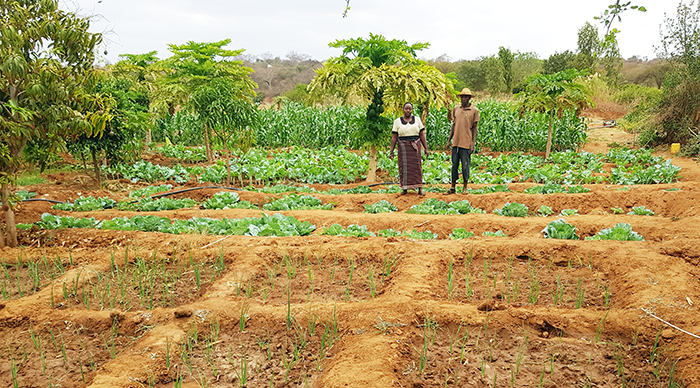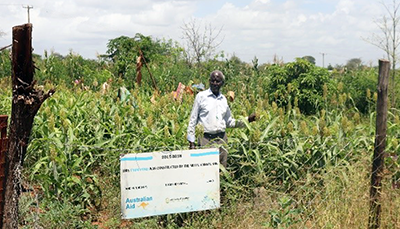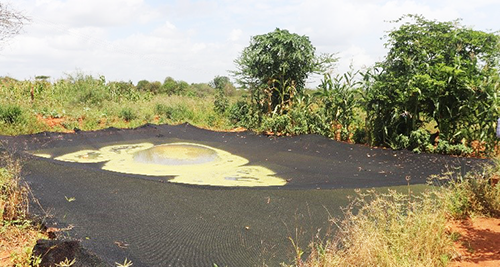ABM Archive Website
THIS WEBSITE CONTAINS ARCHIVE MATERIALS FOR HISTORICAL REFERENCE ONLY
For up-to-date information, including our latest appeals, news, and resources, please visit our current website.
Project Update: Kenya Livelihood Improvement
 |
| Caleb’s recently planted vegetable crops. © ADSE, 2019. |
February 2020
Learning to be Flexible when the Climate is Changing
“It’s important to be flexible with planning and be able to accommodate the changing climatic conditions.” This is a lesson learned by ABM’s partner, Anglican Development Services, Eastern (ADSE) as part of their implementation of the Livelihood Improvement project in semi-arid Kenya this year.
The comment was made in response to severe drought conditions experienced in that part of the world during most of 2019. Traditionally, the Ukumba area of eastern Kenya experienced “short” rains in October to December, and “long” rains from March to May. Last year, there were no long rains, causing hardship to the local farming communities. This meant sand dams, such as the one at planned at Kwa Kinyae, could not be constructed as per the original schedule, due to lack of water. The water table went very low, and the only water available was used for human and animal consumption. Nothing was left for watering crops. These situations cause hunger and other hardships in the communities.
However, good rains came in October to December, and farmers have started to recover, plant crops and expect a good harvest.
With the addition of sustainable water structures such as sand dams, sump wells, irrigation pipes and farm ponds, farmers participating in the project have already benefited in terms of increased production and increased incomes.
We want to highlight the impact that the project is making on several farmers – from 30 year old Caleb and his family, just starting out, to 71 year old Joseph Kituku who has struggled with farming all his life.
Joseph’s story: An Elder of Peace hosts a farm demonstration plot
 |
| Mr Joseph Kituku with the sorghum he has planted as demo plot. © ADSE, 2019. |
Joseph Kituku is a member of two smaller self-help groups that comprise the larger Kiangini Community-Based Development Organisation, in Makueni County, Eastern Kenya. These are “Elders of Peace” and “Mutini Canaan” self-help groups. He has participated in a number of trainings provided by ADSE during the year. These include soil and water conservation, good agricultural practices, and financial literacy. He is also a member of his Village Savings and Loans (VSL) scheme.
Joseph says, “ADSE has supported our group with a farm pond. The group selected me to be their host farmer for the farm pond and other farm demonstrations. The farm pond is now full with water. During the October rains I managed to plant cassavas, watermelons, pepper, amaranth, pawpaw and sorghum in the farm pond plot. I will be watering these crops during the dry season using the farm pond water”.
ADSE established demonstration plots of drought tolerant crops – cowpeas, green grams, and sorghum— and pasture – Cenchrus ciliaris (blue buffalo grass), Eragrostis superba (a perennial tufted African grass), Horse Tail and Panicum Maximum (Guinea grass)— on the farm. The demonstration plots will eventually be used as a farm school whereby other farmers will come during identified field days to learn about the technologies used.
“I really appreciate what ADSE is doing in our region. I will be able to report on sales after I harvest and sell the products in my farm”, said Joseph with real contentment in his voice.
 |
| Joseph Kituku’s farm pond. © ADSE, 2019. |
Caleb Mulwa: A sump well as a glimmer of hope on the horizon
30 year old Caleb is secretary of the Kyunyu Farmers Group which was started in March 2019 by ADSE.
Caleb has been a small scale farmer for several years, facing the usual challenges of lack of enough water, caused by insufficient rains over a long period. Caleb says, “Before ADSE supported us to establish a sump well and piping system, the rains had delayed for a year and we could not manage to do any irrigation. The new sump well is a wonderful structure which has really helped me and the group members. Those farmers near the river gave a piece of land for the group members to irrigate. Willing individual members were also encouraged to farm the land.
Smiling, Caleb continues, “We live near the river and this is a great opportunity for us to utilize the sump well water. I have managed to plant cabbage, onions, maize and kales on my farm. We eat vegetables from the farm and then I sell the surplus to the local traders and neighbours. I don’t take the produce to the market – they come and buy from the farm.
So far, I have managed to sell kale worth 18,200 Kenya shillings (about $270) and maize worth 8,600 shillings ($130).”
As well as receiving much-needed funding from ABM’s generous supporters, this project also receives Australian Aid funding through the Australian NGO Cooperation Program (#ANCP).
![]() This project receives partial funding
This project receives partial funding
from the Australian Government.
< Back


